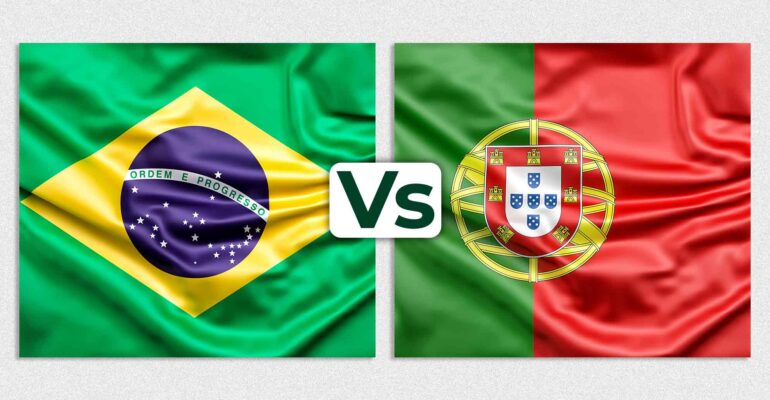Brazilian Portuguese vs. European Portuguese: Key Differences You Must Know!
Brazilian Portuguese vs. European Portuguese: Key Differences You Must Know!
Introduction
Portuguese is one of the world’s most spoken languages, with over 260 million speakers across different continents. But did you know that there are two major variants—Brazilian Portuguese and European Portuguese? While both share the same roots, they have evolved differently over centuries, leading to notable differences in pronunciation, vocabulary, grammar, and cultural expressions. Understanding these distinctions is essential for learners, travelers, and professionals looking to communicate effectively.
Historical Background
Portuguese originated from Latin and was spread across the globe during the Age of Exploration. When Portuguese explorers colonized Brazil in the 1500s, the language began to develop independently. Over time, Brazilian Portuguese absorbed influences from Indigenous languages, African dialects, and even European languages like Italian and German. Meanwhile, European Portuguese remained closer to its Latin roots and developed under different linguistic influences.
Pronunciation Differences
Vowel Sounds
Brazilian Portuguese tends to have open and elongated vowels, making it sound more melodic. European Portuguese, on the other hand, often reduces vowel sounds, making speech sound more compressed.
Consonant Variations
One of the biggest pronunciation differences is the “s” sound. In Portugal, “s” at the end of a word sounds like “sh,” while in Brazil, it sounds like an “s.” Another difference is the pronunciation of “d” and “t,” which are often softened in Brazil (e.g., “dia” sounds like “djee-ah”).
Grammar Variations
Personal Pronouns
- Brazil: Uses “você” for “you” in informal and formal settings.
- Portugal: Uses “tu” for informal speech and “você” for formal situations.
Verb Conjugation
European Portuguese uses a more complex verb conjugation system, whereas Brazilian Portuguese often simplifies certain verb forms in everyday speech.
Placement of Object Pronouns
- Brazil: Pronouns usually come before the verb (e.g., “Me ajudou.””)
- Portugal: Pronouns often come after the verb (e.g., “Ajudou-me.”)
Vocabulary and Word Usage
Some words have completely different meanings in each variant:
- Bus: Ônibus (Brazil) vs. Autocarro (Portugal)
- Juice: Suco (Brazil) vs. Sumos (Portugal)
- Ice cream: Sorvete (Brazil) vs. Gelado (Portugal)
Formal and Informal Speech
Brazilians tend to use more informal speech patterns, while Portuguese speakers maintain more formal structures, even in casual conversations.
Spelling and Writing Differences
After the 1990 Portuguese Orthographic Agreement, spelling differences were reduced, but some remain. For example:
- Reception: Recepção (Brazil) vs. Receção (Portugal)
- Fact: Fato (Brazil) vs. Facto (Portugal)
Sentence Structure and Phrasing
European Portuguese sentences tend to be more structured and formal, whereas Brazilian Portuguese often adopts a more flexible word order, resembling spoken English.
Which One Should You Learn?
If you plan to visit Brazil or communicate with a larger audience, Brazilian Portuguese is more useful. However, if you’re traveling to Portugal or working in Europe, European Portuguese might be a better choice.
Conclusion
Though Brazilian and European Portuguese share the same foundation, their differences are noticeable. Understanding these distinctions will help learners choose the right variant for their needs and appreciate the diversity within the Portuguese language.
Learn Portuguese the Brazilian Way! 🇧🇷✨
At The Brazilian Ways, we believe language learning should be fun, immersive, and deeply connected to culture. Our unique courses help you speak Portuguese naturally while experiencing Brazil through its music, films, literature, and dance.
🎶 The Brazilian Music Club – Learn Portuguese through the rhythm and lyrics of Brazilian music.
🎬 The Movie Club – Improve your Portuguese while exploring the best of Brazilian cinema.
📖 The Short Story Club – Enhance your skills by diving into Brazilian literature.
💃 Portuguese for Zouk – Connect with the Zouk dance community while learning Portuguese.
✨ Join a vibrant community of learners and experience Brazil through language!
👉 Explore our programs and start today! 🚀
📲 Follow us on Instagram for more engaging content, language tips, and cultural insights: @thebrazilianways
FAQs
- What are the biggest pronunciation differences?
Brazilian Portuguese has open vowel sounds, while European Portuguese tends to reduce them. - Can Portuguese and Brazilians understand each other easily?
Yes, but it may take time to adjust to different accents and expressions. - Is Brazilian Portuguese easier to learn than European Portuguese?
Many learners find Brazilian Portuguese easier due to its simpler pronunciation and grammar. - Which variant should I learn for business?
It depends on where you plan to work—Brazilian Portuguese for South America, European Portuguese for Europe and Africa. - How do Portuguese speakers feel about the differences?
Generally, they acknowledge them but can still communicate effectively.













